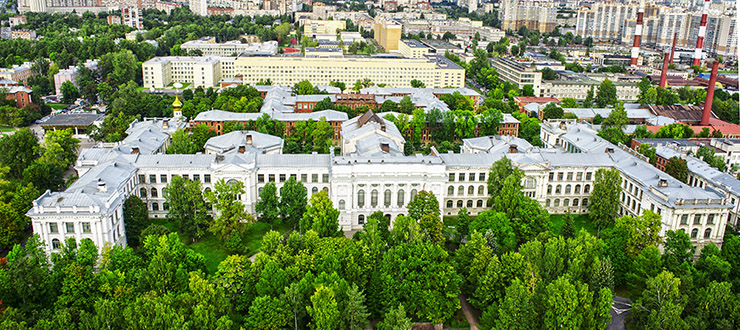An alumnus from the Republic of Congo told, what education at Polytechnic University was like in the previous century
What was Polytechnic education like in the last century? Blaise – Léandre TONDO, a graduate of Polytechnic Institute from the Republic of Congo, who graduated from the Faculty of Hydrotechnics in 1987 and now works for an international organization for integrated water resources management in the Congo River basin in Kinshasa (Democratic Republic of Congo), tried to answer this question. Blaise-Léandre Tondo still warmly remembers his teachers, practical training in Siberia, walks in the center of Leningrad and regrets that he failed to get to the concert of Alla Pugacheva. About this and more in our interview.
Blaise-Léandre Tondo, a graduate of the Polytechnic University of the Republic of Congo, spoke about his studies at SPbPU
– Mr. Tondo, what year did you graduate? Do you remember the name of your faculty?
– I received my degree as a hydraulic engineer in 1987. I studied at the Hydrotechnical Faculty at the Leningrad M.I. Kalinin Polytechnic Institute (as Polytechnic University was then called), majoring in Construction of Hydropower Plants and River Structures.
– What was the reason for choosing this particular specialty?
– I came to the USSR from the Republic of Congo, where I received my Bachelor’s degree from the Technical High School of Brazzaville. In your country I planned to expand my knowledge and become a hydraulic engineer. At first I studied Russian at the preparatory department for foreign students in Leningrad; as I remember now, it was located on Polytechnicheskaya Street in house No. 29. I successfully completed my studies, and by the recommendation of my professors I applied to LPI.
– Was it difficult to study? What subjects did you like the most?
– Of course, studying in the first years was not easy. The learning system was new to me. Every day I left the dormitory early in the morning and came back in the evening. I had to get used to many hours of practical training, theoretical material, a lot of exercises that I had to do in the classroom and at home. The turning point, when I felt that studying became easier, came in the third year. I liked to study the peculiarities of hydrotechnical constructions, geodesy and topography, geology – there were no subjects that I did not like. Moreover, all of them came in handy in my profession as an engineer specializing in the construction of hydroelectric power plants and river structures.
– Were there any teachers that you still remember?
– Of course! Pavel MIRGORODSKY – he lectured on hydraulic engineering, Vyacheslav ORLOV, the lecturer in hydraulics, and many others. From the bottom of my heart I would like to thank all my teachers and all the management of the Leningrad Polytechnic Institute!
– And what was life like in those days outside the university?
– Quite intense! I lived in the dormitory across from the Lesnaya metro station. Every evening my classmates helped me to do exercises in the study room. There was a gym and a cáfe in our dormitory. I loved walking around the historical center of Leningrad. I remember how sometimes on Sundays I used to go for lunch to a cafeteria located across from the Aurora cruiser. I also remember our internship: our group was on the construction site of the Boguchanskaya hydroelectric power plant in Siberia. It was not far from the city of Omsk. And one interesting incident happened there.
– I’m intrigued! Tell me about it.
– In the village where we lived, I was the only black man. One day we were playing football, and all the villagers came to applaud me, because they associated me with Jean TIGANA, the French football player from Mali, one of the brightest players of that time. It was 1984 and the French had just won the European Championship. For some of the villagers, I was the first dark-skinned man they had ever seen. I was constantly invited to visit, to socialize – I still remember those times fondly.
Graduate of the M.I. Kalinin Leningrad Polytechnic Institute Blaise-Léandre TONDO
– Do you remember what music you listened to, what movies you watched?
– I loved listening to Alla Pugacheva’s songs, especially the Ancient Clock and A Million Scarlet Roses. I still regret that I never got to go to her concert. I watch the 17 Moments of Spring pretty often, the musical accompaniment to which is admirable! I also love symphonic music, above all the Swan Lake ballet by Pyotr Ilyich Tchaikovsky.
– How did your life go after graduation??
– I returned to the Republic of Congo, moved to Bangui, the capital of the Central African Republic, and got a job as a trainee engineer at the Ministry of Energy and Hydraulics. A year later, I moved to the presidential residence of the Central African Republic as head of the hydraulic equipment department. From July 1, 1991 to March 31, 2005, I worked at the Central African Power Company (ENERCA), building the hydroelectric plant Boali 3. Later, I studied energy economics at a French university, worked as a hydraulic engineer and energy economist. And since April 2005, I have been working for the International Organization for Integrated Water Resources Management (IWRM) of the Congo Basin in Kinshasa, the capital of the Democratic Republic of Congo.
– Impressive! Tell us, what did the university teach you?
– University taught me first and foremost that with scientific knowledge one can improve the environment and live in harmony with oneself and the world. The most important thing is to wisely allocate the resources you have.
– Mr. TONDO, thank you for the interesting interview! We wish you success and prosperity!

